Steph W. from SEOPressor


...help you check your website and tell you exactly how to rank higher?


69
score %
SEO Score

Found us from search engine?
We rank high, you can too.
SEOPressor helps you to optimize your on-page SEO for higher & improved search ranking.
By winniewong on September 25, 2015

Have you ever heard of Ernest Hemingway? Ever wanted to learn what are some of his greatest writing skills and to put it in good practice when it comes to blogging?
Well I’m pretty sure many of you’d have heard of him. In case you don’t.
Mr. Hemingway was a great American novelist and had won the Nobel Prize in Literature back in 1954. He was famously known for his understated and simplistic writing style which has gained him much popularity and he has influenced the work of many writers of all genres for decades.
In today’s article I would like to explain a little bit about his writing theory and how understanding such theory can help us into becoming a better writer. And I believe that there is no other way to learn good writing skills other than learning from one of the best writers in the world.
So, let’s us look at what his theory is all about.
Hemingway referred to his writing style as the “Iceberg Theory,” which is better known as the “Theory of Omission.”
So what does this “Theory of Omission” really means?

It simply means that he believes in stripping everything bare naked and he suggests you to do the same to your readers. Well basically I’m referring to your sentence.
Well he suggested that sometimes you can leave out some important points that you are aware of, then your story is strengthened because it is the things that you omitted that makes your writing looks more credible and authentic.
But if you leave something out because you didn’t know anything about it, then your story is considered worthless. Well, this makes a pretty good sense because at the end of the day that’s the last thing you would want your readers to feel about your writing.
That’s why Hemingway gave his readers the facts.
He believes that the important information is usually comprised at the tip of the iceberg – that’s where when it comes to blogging, we write our best introduction with the most interesting fact (the one-eighth that floated just above the water). While the other supporting structures will remain below the surface which are usually out of the readers’ sight.
Again what he trying to say is that as long as the writer does his job, and tells nothing but the truth, the reader will innately fill in the missing information.
So a quick recap on the purpose of this theory; writers could withhold a certain information they know, and let their readers to sift through the implicit meaning on their own. That will give more chances for your readers to explore and to play around with their own imaginations.
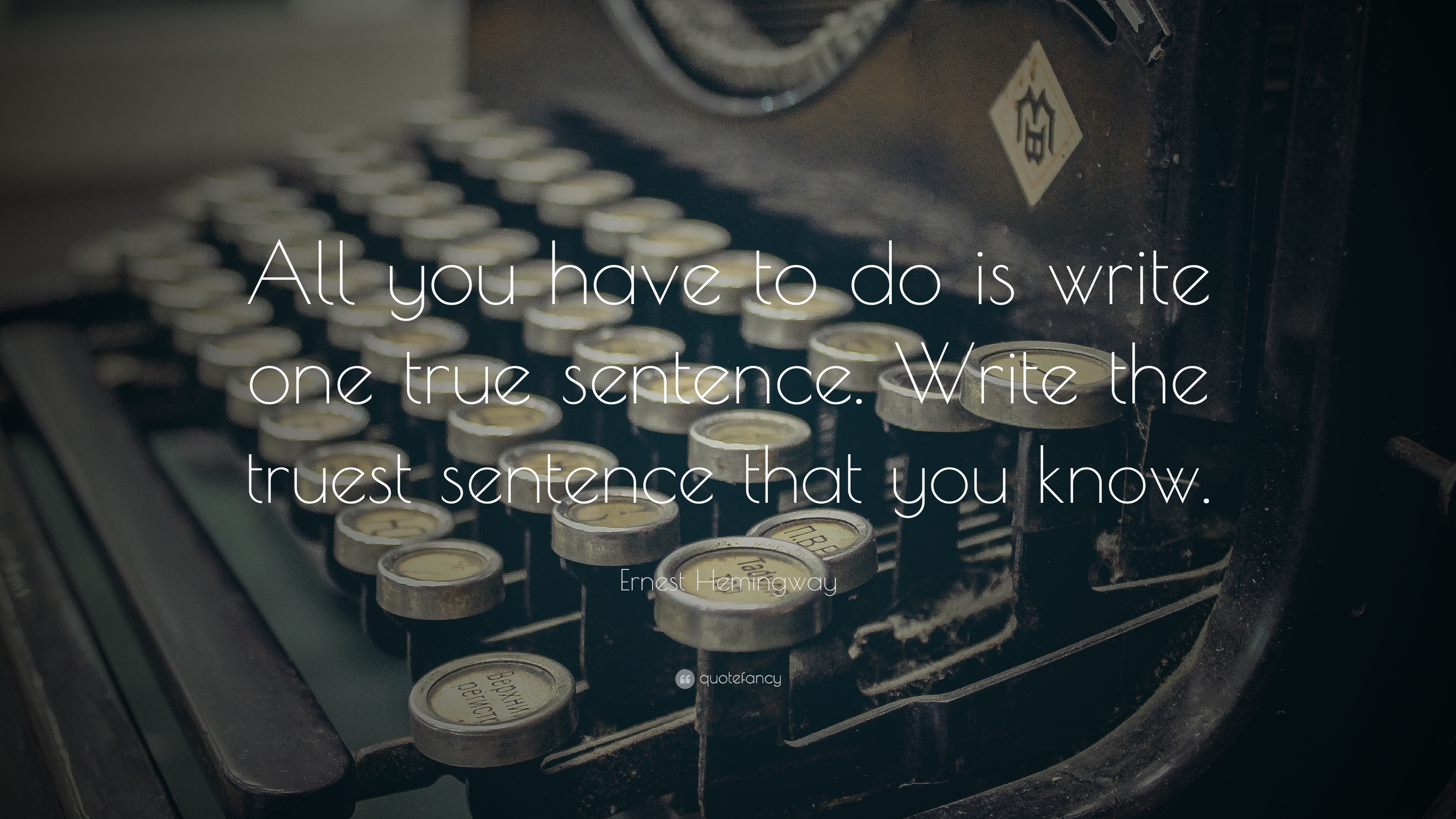
The author’s advice for overcoming writer’s block and getting the words to flow is to “write the truest sentence you know.”
This is indeed a very good piece of advice. If you want to overcome your writer’s block the first thing you need to do is to write one truest sentence that you knew, seen, or heard from someone else before.
Action step:
Ask yourself by asking some questions like, what is your biggest passion when you start to blog?
What is that something that makes you want to become a good writer?
Clear up your mind and think about for awhile. Then start by writing the most truthful sentence that comes into your own mind. Ya, sometimes I just have to admit that it is much easier said than done. But trust me, if your intention is of goodwill then eventually the outcome of your results shouldn’t be too far off from what your own expectations.
Even there is a majority of bloggers out there with an intention of selling something to their readers at the end of the day, they can still strongly hold on to their principles by producing valuable content that’s beneficial to their readers rather than simply producing some crappy content.
So start by listening to your own voice and write something that’s truly matters to you. It is always easier to go on with your writing in that way than from someone else’s voice.
Hemingway’s early years as a reporter and writing short stories helped him to develop his minimalist writing style. He learned how to get the most from the least.
He did away with flowery adjectives and used only nouns and verbs to tell his story.
According to lore, Hemingway, won a $10 bet with a group of writer to determine which of them could pen an entire novel – beginning, middle, and end – in six words.
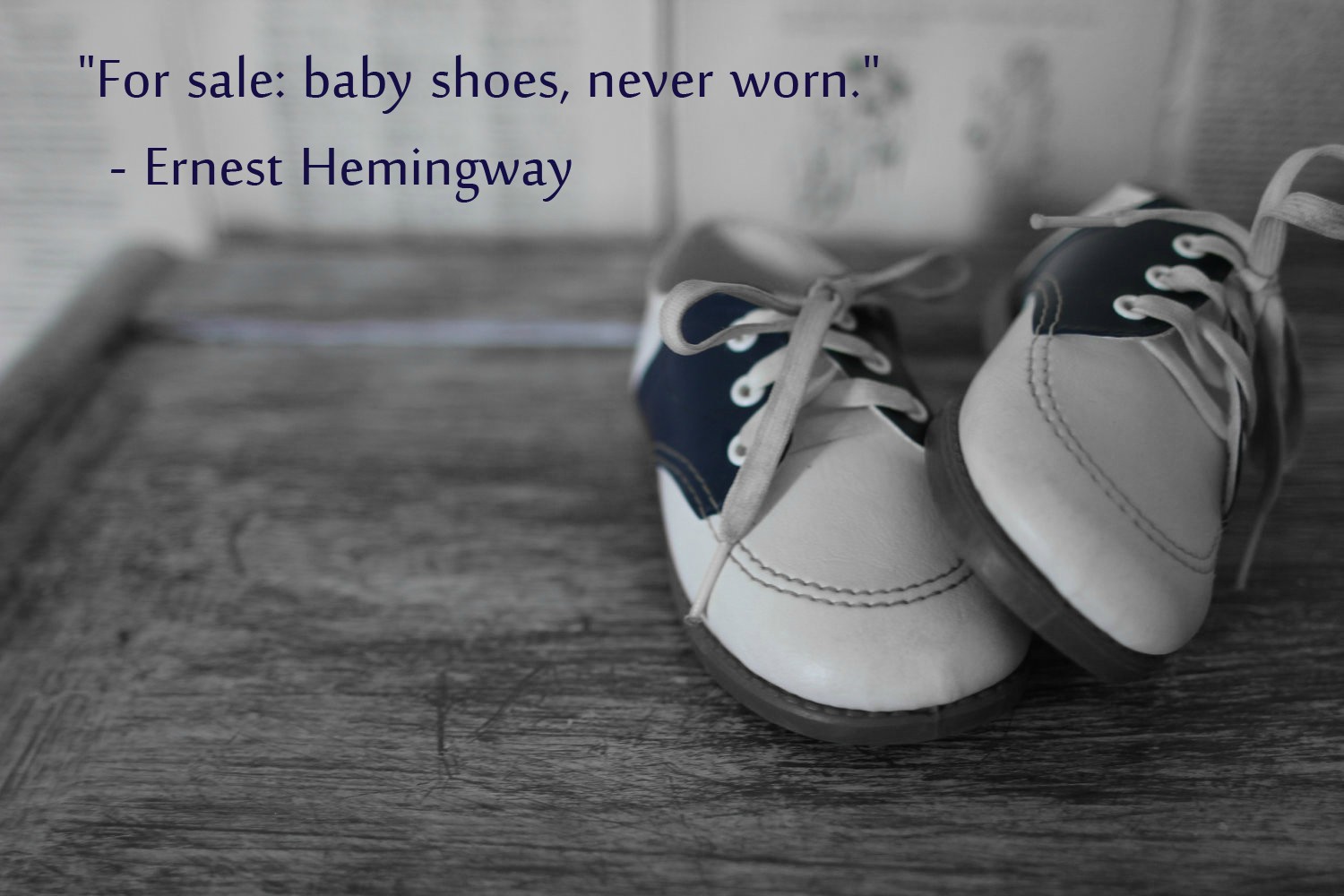
As you can see from these six letter words, it is short and powerful enough to tell a story that could elicits various explanations and emotions.
According to the Theory of Omission, this is exactly what Hemingway was trying to say. What is left unsaid is more powerful than said.
Action step:
It is always good to keep your sentences short and precise so that readers can understand your meaning and remember your ideas better. Try to avoid using long sentences as it tend to confuse readers of what you’re trying to say.
So use short sentences to make your communication more powerful. Mix up your use of shorts entices with a phrase or single word. Three or four sentences are usually good enough. Short sentences work well at the start of a paragraph and at the end to signal summarization or completion.
Sometimes, It is even better if you can write it short while maintaining a certain level of curiosity just like how Hemingway did it in that six letter words.

Often times I can tell that most of us, as writers, we just couldn’t resist pouring out all of our creative ideas and began to write “elaborately.” Certainly we may end up demonstrating our wits and ability to turn boring phrases into some smartly worded phrases.
However, Hemingway doesn’t want his writing to be in that case. He believes that it is important to cut out what he calls “crap.”
Action step:
So the next time, once you have written your draft, it is always good to get rid of any extraneous self-indulgent words and passages. That is because these words are truly unnecessary and the fewer misleading words you have, the better you will paint a truer picture for your readers.
Again the next time when you think you are finished with the editing, go back and cut the words count even more before you publish the piece.
Hemingway learn that from the very moment he put away anything he was working on, he relaxed, went fishing, swimming, bar hopping, or whatever he wanted to do that day.
“If you do that, you will never be stuck,” said Hemingway.
The acclaimed author did not think or worry about the work until he began working on the piece the next day.
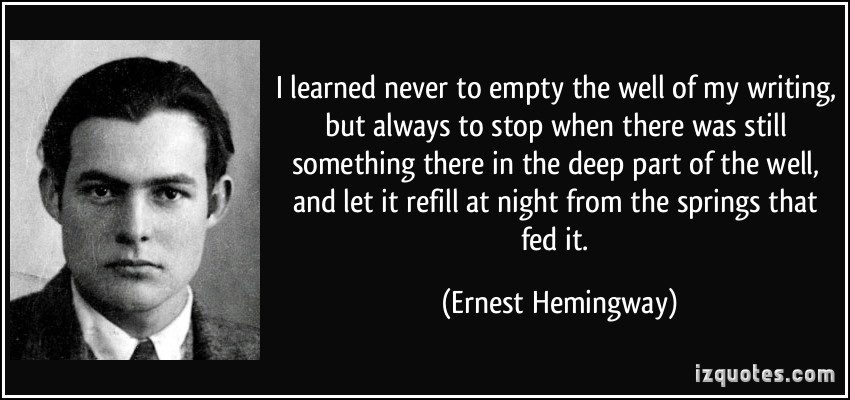
He also said that, “I had learned already never to empty the well of my writing, but always to stop when there was still something there in the deep part of the well, and let it refill at night from the springs that fed it.”
In other words, he allowed his subconscious mind to go to work while he is asleep. In between, he made it a point to observe what was going on around him and to pay particular attention to what other people were saying.
Action step:
It is always advisable to let your mind rest by not thinking about it and to fully enjoyed what you are doing while you are not writing. Allow your subconscious mind to take over and prepare for the next round of writing.
Conversely, if you insist on pondering your next post and worry about it, your conscious mind will get tire before you ready to write again.

Write what you know, but discard the background because the details are interchangeable or unimportant. When you shed the background material, what remains is the essential part of the story.
Action step:
A good blogger will know how important it is to lay down the most interesting facts when writing a so-called good article. And in order to do that, as a blogger, you need to do a thorough research on the particular topic and then decide what to add in and what to leave out.
Besides, you need to know the objectives of writing that particular topic. Ask yourself is it to educate your readers or you just want to sell them something.
If your objective is to educate them, then you can give your readers just enough information for them to use their own imagination to fill in the back-story. However, if you want to sell them something, then your sales letter needs to be incredibly convincing and a little direct and avoid going round the bush. Tell them everything upfront and what is it in for them if they’re going to make an immediate purchase from you.

Hemingway, knowingly omitting information of part of a story could actually strengthen the piece. In addition, the omission of information had a way of engendering a certain feeling within the reader, without a need for the writer to state the obvious.
Borrowing from his iceberg theory, “the dignity of movement of this force of nature has to do with one-eighth of the iceberg being above water, and the remainder of the hidden underneath the surface. As a result, a writer who omits things because of a deficit of knowledge will end up with void places in his writing.
Action steps:
Unless you are writing for a beginning audience, always assume that your readers come to the blog with a certain level of knowledge. The intelligence level of the targeted group allows them to fill in the blanks. So it is always advisable to know who are your audience and keeping in mind that what you’re writing and omitting makes a complete sense to them. Which is why learning how to omit a certain information in order to strengthen a story is never an easy task but remember hard work always payoff.
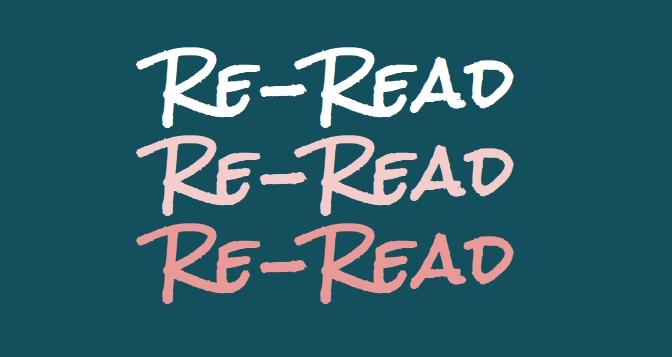
Never one to write until he exhausted himself, Hemingway stopped writing when he knew what was going to occur next. At the end of a writing session, Hemingway made it a habit to go back and re-read his work from the start to the point where he stopped the previous day. If the work is too long, he read 2-3 chapters, and re-read the total work once a week.
Action step:
After you complete finish writing your post and checking for your grammatical mistakes, it is always advisable to read the post before you publish it. So the next time when you’re rereading your writing, ask yourself some of these questions.
Some people prefer to schedule the post so that it gives them another chance to read it over before going live. Immediately after you publish, read your post again. The chances are that you will find a few ways to improve the final version.
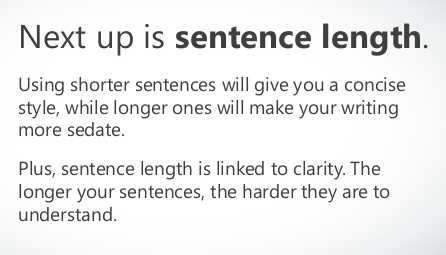
Hemingway went to great lengths to get rid of all wordiness and flair in his writings. So it is always advisable to break up long and complex sentences and see if you can rephrase it to improve on the readability. But clarity was not the only reason for Hemingway’s brevity.
Another thing he looked at is the sentence speed. He believes that writing short sentences will give readers a better notion of what he’s trying to say even if they were just skimming it through his articles.
This is another great piece of advice that every blogger should take into consideration.
According to Nielsen Norman Group, they’ve found out that 79% of users scanned a new page they came across and only 16% read word by word when it comes to reading online.
Action step:
So, it is always advisable if you can trim down your writing for the web and get to the meat of what you want to say. Even after you’ve shaped and polished what you believe to be the best post possible, there is always words you can remove and still accomplish your purpose.

The creative act of writing is a generative process; therefore, you must turn off the inner critic to unleash the creative genius and allow your words to flow unencumbered, and you may end up with a muddled awkward and unfocused mess. Allow the words to mingle and salivate for a day. When you return to your writing the next day with fresh eyes, edit and make the necessary corrections as you re-read your work.
Action step:
You may not have 24 hours, but you should allow your post to sit for a few hours before you return to judge the piece. Sometimes the longer the better because after awhile, when you look back at your own draft, you will be able to read it from reader’s perspective rather than the writer’s perspective.

This is a pretty good advice from Mr. Ernest Hemingway. He enjoyed drinking, but refrains from alcohol when writing. Hemingway, who had tremendous focus when writing said, “My training was never to drink after dinner nor before I wrote nor while I was working.” Studies have shown that drinking just a couple of beers can make you less focus.
Action step:
Your writing will not become more magical by drinking. Conversely, other studies demonstrate that a couple of drinks proved helpful when the person needs to produce ideas.
Once you have published your content, make sure to analyze them using the BiQ’s Content Intelligence.

It is easy to use this amazing tool. Just enter your content’s URL and keyword, and it will start to analyze the content. It will reveal all the insights you need to know about your content, including readability, sentiment distribution, semantic and keyword density, and more!

BiQ’s Content Intelligence will also provide you with a list of AI-guided optimization suggestions to help you improve your rankings and traffic.

The best part?
This content tool will analyze each and every paragraph and show you their relevancy, type of sentiment, and readability. With these insights, you will be able to understand what your readers feel when they read your content and how relevant the content is to their intent.

Always remember that Hemingway’s straightforward writing style epitomizes the way bloggers should approach their writing. So if you are serious about being a good writer, you need to adopt some of his principles and advice and put it in real good practice. So tell your readers what they want and need to hear. Omit unnecessary words and information (during your revision) and leave it up to your reader to fill in the rest of the story.
Related Links:
Updated: 3 July 2025


Save thousands of dollars (it’s 100x cheaper)

Zero risk of Google penalty (it’s Google-approved)

Boost your rankings (proven by case studies)
Rank High With This Link Strategy
Precise, Simplified, Fast Internal Linking.
